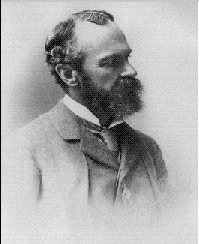American pragmatism
Created by Mark Syvertson
"Pragmatism emerged as a characteristically American response to an inheritance of British empiricism. Presenting a radical reconception of the nature of experience, pragmatism represents a belief that ideas are not merely to be contemplated but must be put into action, tested and refined through experience. At the same time, the American pragmatists argued for an emphasis on human community that would offset the deep-seated American bias in favor of individualism.
Far from being a relic of the past, pragmatism offers a dynamic and substantive approach to questions of human conduct, social values, scientific inquiry, religious belief, and aesthetic experience that lie at the center of contemporary life." (http://www.press.uillinois.edu/s99/rosenthal.html)
Background:
Pragmatism is considered to be the first American contribution to philosophy and contained typically American ideals: 1) basic optimism, 2) an emphasis on action, 3) the belief that the future can be changed by human ideas and efforts. Derived from the Greek word for practice or practical, American pragmatism deals with a method of obtaining knowledge through real-world effects. It arrives at knowledge through human theorizing, which founders Charles Sanders Peirce and William James declared as essential to true understanding. Peirce and James pondered how theoretical concepts influence human decisions and questions. Pragmatism extends into three distinct philosophical areas of human understanding: philosophy of science, philosophy of mind, and philosophy of religion.
Pragmatist Philosophers:
I. Charles Sanders Peirce
Charles Sanders Peirce, born in 1839 in Cambridge, Massachusetts, graduated from Harvard in 1859. Peirce was an extraordinary mathematician and practicing chemist who pursued scientific philosophy and logic as his vocation. Peirce's central concept proposed that the meaning and truth behind an idea could only be found in the idea's effects in practice and in conduct. In his book, "Illustrations of the Logic of Science" Peirce developed definitions for "belief" (the habit or rule of action) and "thinking" (the struggle to eliminate doubt in ones understanding) which provide a foundation for the concept of pragmatism. He died in 1914 of cancer and did not live long enough to see his theories realized.

II. William James
Building on Peirce's concepts, William James strived to make pragmatic beliefs easily acceptable. Born in 1842, James came from a wealthy family, which enabled him to explore his passions with little concern for money. James was the first person to make the foundations of pragmatism easily accessable to the academic community. His interpretation of Peirce's ideas lead him to believe that supposedly different ideas that have identical consequences in practice are the same ideas using different words. The meaning of an abstract idea come from the idea's effects on the person who believes it. James proposed using empirical proof not just for science, but for ideas as well. Truth must be changeable, James argues, because true ideas agree with reality. Therefore, we can make ideas true by our actions, thus changing the world we live in.

American Pragmatism in Literature:
I. Overview
In part as a reaction to Impressionism, the origin of pragmatist concepts in literature are often traced back to Ralph Waldo Emerson. His insistence that values must prove their relevance to contemporary life is one of central structural concepts found in pragmatist beliefs. T.S. Eliot also subscribed to the notion of subjective human perception and much of his poetry dealt with imagist concepts, which focused on accuracy and precision rather than emotional attachments. Later in the 20th century, the emergence of such diverse poets as William Carlos Williams and Robert Frost cemented pragmatism as a strong influence on modernist ideals and concepts with their belief in humans acting on nature, instead of the inverse.
II. Literary Pragmatists
B. T.S. Eliot
C. Robert Frost
"Charles Sanders Peirce is considered the founder of pragmatism, although later he changed the name of his philosophical position to "pramaticism." He developed it as a theory of meaning in the 1870s, holding that an intrinsic connection exists between meaning and action -- that the meaning of an idea is to be found in its "conceivable sensible effects" and that humans generate belief through their "habits of action." William James gave a further direction to pragmatism, developing it as a theory of truth. True ideas, according to James, are useful "leadings"; they lead through experience in ways that provide consistency, orderliness, and predictability. John Dewey was another leading pragmatist whose influence on educational and social theory is still prevalent in American society." (http://www.radicalacademy.com/amphilosophy7.htm)
Sources:
Konvitz, Milton and Gail Kennedy. The American Pragmatists. New York: The World Publishing Company, 1960.
Moore, Edward C. American Pragmatism: Peirce, James, and Dewey. New York: Columbia University Press, 1961.
Rucker, Darnell. The Chicago Pragmatists. Minneapolis: University of Minnesota Press, 1969.
"Pragmatism." Wikipedia, the Free Encyclopedia. 26 April 2007. <http://en.wikipedia.org/wiki/Pragmatism>
http://www.press.uillinois.edu/s99/rosenthal.html
Link Sources
Ralph Waldo Emerson - <http://en.wikipedia.org/wiki/Ralph_Emerson>
T.S. Eliot - <http://en.wikipedia.org/wiki/Ts_eliot>
Robert Frost - <http://en.wikipedia.org/wiki/Robert_Frost>
William Carlos Williams - <http://en.wikipedia.org/wiki/William_Carlos_Williams>
Back to Encyclopedia Home Page